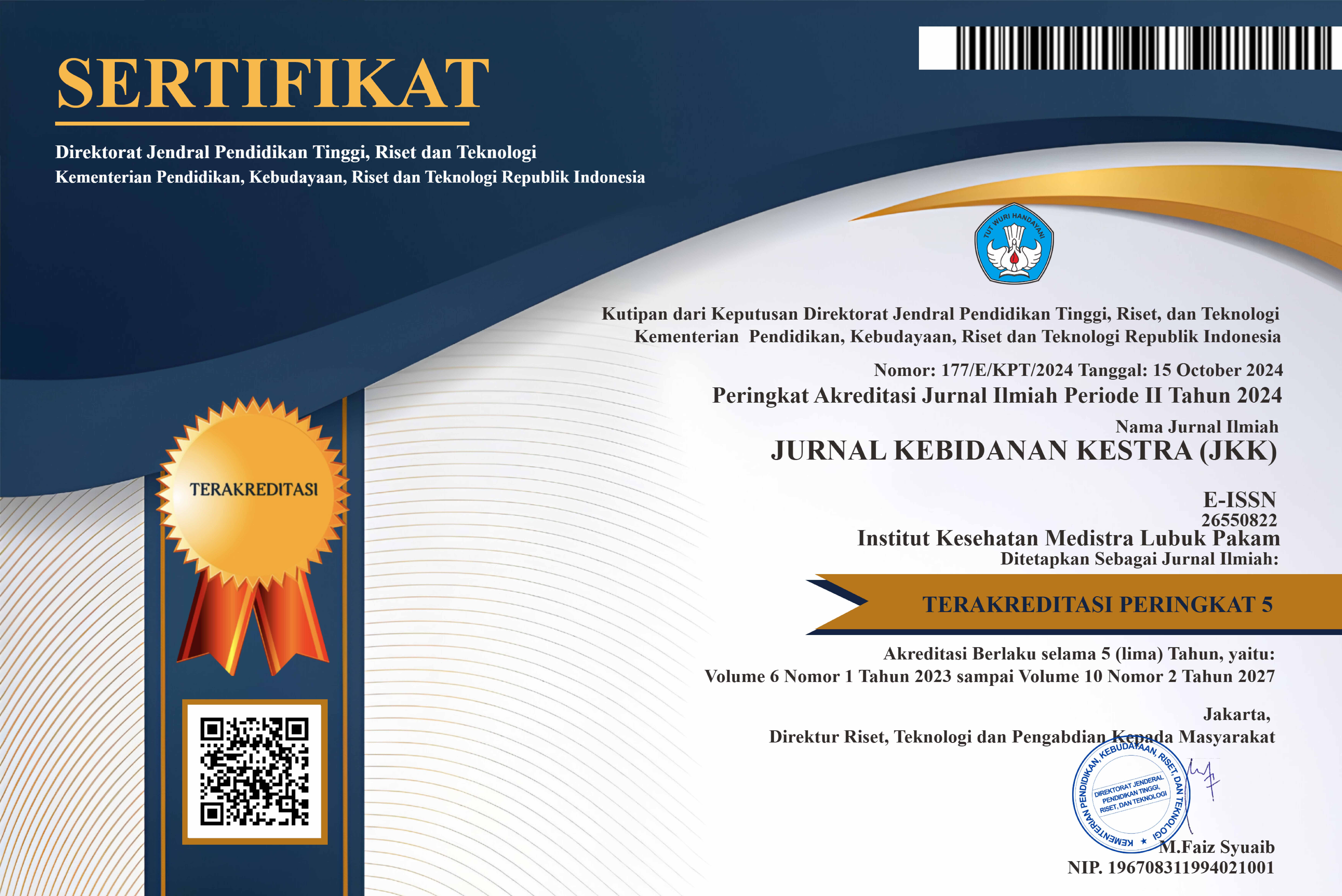The Relationship Knowledge and Family Support With Pregnant Women's Class Participation
DOI:
https://doi.org/10.35451/jkk.v6i1.1912Keywords:
Knowledge, family support, class participation for pregnant womenAbstract
Knowledge is a motivating factor for someone to change their behavior. If a pregnant woman knows about a class for pregnant women, it is likely that they will take the class. Family support is also very influential in determining a mother's health behavior. Pregnant women follow the advice given by their families. This study aims to identify the relationship between family knowledge and family support and the involvement of pregnant women in classes in the work area of the Manna City Health Center, South Bengkulu Regency. Analytical use as a cross-sectional research design This research involved 45 samples from all pregnant women in their third trimester in the Manna City Health Center work area, South Bengkulu Regency, from October to November 2022. Data analysis used univariate and bivariate analysis and the chi-square test. The results obtained were mostly with insufficient knowledge (42.2%), with families who were not supportive (62.2%) and who did not regularly attend classes for pregnant women (51.1%). The results of the chi-square test for the knowledge variable show that the calculated ?2 value (6.72) > ?2 table (5.491) and the value ?(0.035) <?(0.05), and for the family support variable, the calculated ?2 value (6.63) > ?2 table (3.481) is obtained. and the value ?(0.010)<?(0.05). This research concludes that there is a relationship between knowledge, family support, and class participation for pregnant women. It is recommended that midwives be more active in disseminating information about the pregnant mother class program to pregnant women and to husbands, partners, and families.
Downloads
References
Agustianti dkk. (2023). Buku Ajar Keperawatan Keluarga. Mahakarya CItra Utama.
ariani dkk. (2021). Asuhan Kebidanan Perempuan dan Anak Dalam Kondisi Rentan. Rena Cipta Mandiri. https://www.google.co.id/books/edition/ASUHAN_KEBIDANAN_PADA_PEREMPUAN_DAN_ANAK/mB-HEAAAQBAJ?hl=id&gbpv=1&dq=Dukungan+suami+dalam+bentuk+dukungan+instrumental&pg=PA103&printsec=frontcover
Atif etall. (2023). The impact of partner’s behaviour on pregnancy related outcomes and safe child-birth in Pakistan. PubMed Central, 23(5). https://doi.org/https://doi.org/10.1186%2Fs12884-023-05814-z
Dani dkk. (2021). Hubungan Paritas Dan Dukungan Keluarga Dengan Partisipasi Ibu Mengikuti Kelas Ibu Hamil. Jurnal Kesehatan Tambusai, 2(4), 419–424. https://doi.org/https://doi.org/10.31004/jkt.v2i4.3699
Desmariyenti dkk. (2019). Faktor Yang Berhubungan Dengan Keikutsertaan Ibu Dalam Kelas Ibu Hamil. Jurnal Photon, 9(2), 114–122. https://doi.org/https://doi.org/10.37859/jp.v9i2.1126
Kemenkes RI. (2014). Pedoman Pelaksanaan Kelas Ibu Hamil. Kementerian Kesehatan Republik Indonesia.
Kemenkes RI. (2018). Riskesdas.
Kemenkes RI. (2021). Survey Demografi Kesehatan Indonesia. https://www.kemkes.go.id/article/view/23010900002/Profil-Kesehatan-Indonesia-2021-versi-bahasa-inggris.html
Kemenkes RI. (2023). Turunkan Angka Kematian Ibu melalui Deteksi Dini dengan Pemenuhan USG di Puskesmas. https://sehatnegeriku.kemkes.go.id/baca/rilis-media/20230115/4842206/turunkan-angka-kematian-ibu-melalui-deteksi-dini-dengan-pemenuhan-usg-di-puskesmas/
Melyani dkk. (2020). Hubungan Antara Pengetahuan Dengan Keikutsertaan Pada Kelas Ibu Hamil DI Puskesmas Wajok Hulu Kabupaten Mempawah Tahun 2019. Jurnal Kebidanan, 10(1), 502–509. https://doi.org/https://doi.org/10.33486/jurnal_kebidanan.v10i1.119
Sari, L. L. (2021). Faktor-Faktor Yang Berhubungan Dengan Kejadian Anemia Pada Ibu Hamil. Jurnal Sains Kesehatan, 28(3), 20–30. https://doi.org/http://dx.doi.org/10.37638/jsk.28.3.20-30
Sari, L. L. (2022). Hubungan Obesitas Dengan kejadian Preeklampsia Pada Ibu Hamil. Jurnal Mitra Rafflesia, 14(1), 1–6. https://doi.org/http://dx.doi.org/10.51712/mitraraflesia.v14i1
Stoll, H. (2020). Childbirth Education and Obstetric Interventions Among Low-Risk Canadian Women: Is There a Connection? The Journal Of Perinatal Education, 21(4), 229–237. https://doi.org/https://doi.org/10.1891%2F1058-1243.21.4.229
Tasijiwa dkk. (2022). Recovery Skizofrenia. PT.Nasyah Expanding Management. https://www.google.co.id/books/edition/RECOVERY_SKIZOFRENIA/k9iAEAAAQBAJ?hl=id&gbpv=1
Zahra dkk. (2022). Peran Suami Pada Masa Kehammilan. Jurnal Kesehatan, 13(2). https://doi.org/J URNAL KESEHATAN – V OLUME 1 3 N OMOR 2 ( 202 2 ) 2 48 - 2 5 7 Available online at?: http://ejurnal.stikesprimanusantara.ac.id/ Jurnal Kesehatan | ISSN ( Print ) 208 5 - 7098 | ISSN (Online) 2657 - 1366 | DOI: http://dx.doi.org/10.35730/jk.v13i2.706
Downloads
Published
Issue
Section
License
Copyright (c) 2023 Liya Lugita Sari, Taufianie Rosita, Yesi Putri

This work is licensed under a Creative Commons Attribution 4.0 International License.
Copyright in each article is the property of the Author.



























